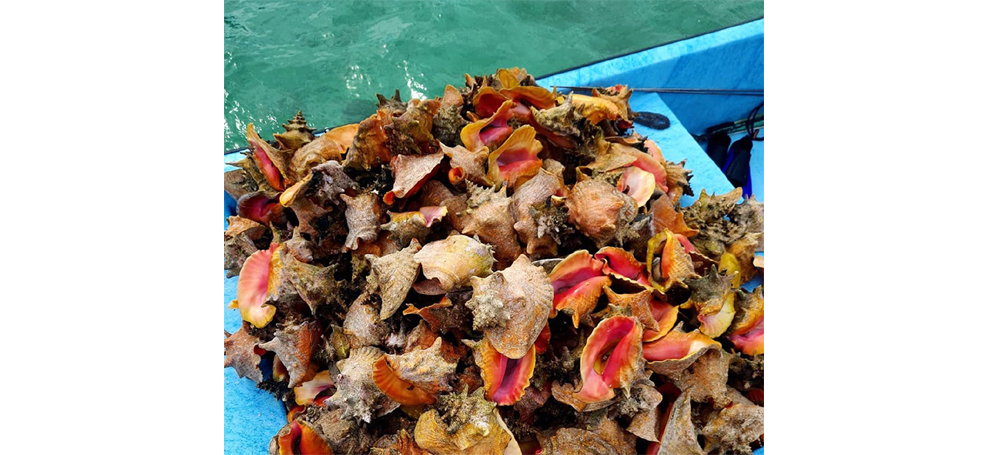Photo: Conchs fished at sea
Illegal conch fishing leads to alleged corruption in Fisheries Department
by Kristen Ku
BELIZE CITY, Thurs. Oct. 5, 2023
Twelve fishermen from Chunox Village, Corozal District, are facing a hefty fine of $70,000 after being caught in possession of a significant number of conch mere hours before the official opening of the conch season.
The fishermen who were charged are Graciano Tun (47), Valderrama Santoya (38), Ivan Wilber (25), Wilfred Tun (30), Marcel Mendez (32), Arick Romero (37), Edson Santoya (31), Ronald Santoya (39), Egbert Mendez (35), Jorge Casanova (25), Edimar Santoya (30), and Adrian Montalvo (47).
On the evening of September 30, around 9:00 p.m., these fishermen were apprehended near the Lighthouse Reef Atoll aboard their vessel, Luisannie. Officers from the Fisheries Department reported finding approximately 1,100 conchs on the boat.
In court, each fisherman was slapped with multiple fines. They were jointly charged for each conch found in their possession, and together they must pay a total of $55,900, which must be paid by February 28, 2024, if they are to avoid imprisonment. Additionally, seven of the fishermen who were first-time offenders received additional penalties of $1,005, which they must pay by January 31, 2024, in order to avoid a 3-month jail sentence, while three repeat offenders were fined $1,505.
In Belize, the closed season for conch extends from July 1 to September 30, a time set aside to allow the conch to mate and reproduce, thus ensuring their survival. However, many fishermen try to gain an advantage by diving for conch before the official opening of the season on October 1.
Amandala spoke with Hampton Gamboa, Supervisor of the Conservation Compliance Unit at the Fisheries Department. He mentioned the department’s increased operations during the month leading up to the season’s opening.
“We have made multiple arrests over the past 4 weeks for conchs during the closed season. Whether it’s conch season or whether it’s lobster season, we do come across people committing this infraction of possession,” Gamboa stated.
In regard to what happens with the conchs after they have been confiscated, Gamboa explained that, as stated by the magistrate, the department is tasked with disposing of it. One way they do so is through donations to different children’s programs.
“The plan that we have for these products, and all the different products that were seen during these four weeks, is for us to distribute these products to feeding programs in schools, in particular, and a couple of the children’s homes, including Dorothy Menzies Child Care Center and Liberty Children’s Home,” he explained.
The most recent arrests on the eve of the opening of the season are just one instance of many similar arrests of fishermen who have been fined after being busted with conch during its closed season.
On September 19, another fisherman, Jose Esquizabal from Sarteneja, was caught with 15 fillet conchs and fined nearly $4,000 in Belize City. Esquizabal, however, made bold claims of corruption within the Fisheries Department, alleging that some officers accept bribes to overlook illegal catches. He claims his refusal to pay led to a direct threat from an officer.
Gamboa responded by stating that police had been brought in to investigate the claims, and that they had even located Esquizabal in Sarteneja Village for an interview. However, he refused to share further information regarding his allegations.
“My officers have been working tirelessly at night and not being compensated, but nobody looks at that. Everyone looks at the allegations,” said Gamboa.
Many local conch divers echo Esquizabal’s claims. Speaking anonymously at a Belize City fish market, some shared stories of paying off officers to avoid legal repercussions.
“The job is a beautiful job, because hustling out at sea is great. All the reserved areas, the officers allow fishermen to fish at, but they just have to pay them [the officers] and you can do whatever you want,” one said.
Even when the season is open and fishermen are caught with undersized products, another claimed, “You can work something out with them and save you’re a** from going to court.”
They added, “If they are not collecting from you, you will have a problem with them. If you are giving them some money, they could see you and they could see that you are doing something illegal, and they won’t even worry about you.”
“It helps us out a whole lot. Because if they didn’t, do you know how many fishermen would be in jail right now? Or have a big bill to pay? It saves us a whole lot,” one of them said.
We asked Gamboa for his reaction to such allegations; however, he explained that he was not in the position to comment. So we attempted to contact Mr. Rigoberto Quintana, the Fisheries Administrator, but were told by his secretary when we called that he was not in the office for the day.
We even tried asking for Quintana’s second-in-command, Adriel Casteneda, the Senior Fisheries Officer, and were informed by the said secretary that he was not in the country.
In an effort to show our persistence in giving the department an opportunity to respond to these allegations, we went to their office. However, the secretary seemed unwilling to assist and defensive.
When we requested her name, she not only refused to provide it, but claimed that we were recording her through audio and threatened to sue us if we made reference to anything she said—specifically, the fact that fishermen such as Esquizabal were not credible sources.
We left, but with no answers. The department has yet to respond.
Lingering questions remain: Is it a case of one or a few “bad apples” in uniform giving the Fisheries Department a bad name? Or is the problem in water the same as it was said to be on “Lands”?

